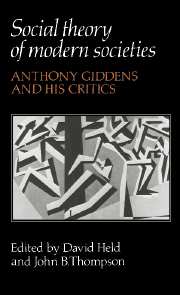Book contents
- Frontmatter
- Contents
- List of contributors
- List of abbreviations
- Editors' introduction
- 1 Social theory as critique
- 2 Hermeneutics and modern social theory
- 3 The theory of structuration
- 4 Models of historical trajectory: an assessment of Giddens's critique of Marxism
- 5 Capitalism, nation-states and surveillance
- 6 War and the nation-state in social theory
- 7 Only half the story: some blinkering effects of ‘malestream’ sociology
- 8 Citizenship and autonomy
- 9 Presences and absences: time–space relations and structuration theory
- 10 Space, urbanism and the created environment
- 11 On the (ir)relevance of structuration theory to empirical research
- 12 A reply to my critics
- Select bibliography
- Index
4 - Models of historical trajectory: an assessment of Giddens's critique of Marxism
Published online by Cambridge University Press: 24 November 2009
- Frontmatter
- Contents
- List of contributors
- List of abbreviations
- Editors' introduction
- 1 Social theory as critique
- 2 Hermeneutics and modern social theory
- 3 The theory of structuration
- 4 Models of historical trajectory: an assessment of Giddens's critique of Marxism
- 5 Capitalism, nation-states and surveillance
- 6 War and the nation-state in social theory
- 7 Only half the story: some blinkering effects of ‘malestream’ sociology
- 8 Citizenship and autonomy
- 9 Presences and absences: time–space relations and structuration theory
- 10 Space, urbanism and the created environment
- 11 On the (ir)relevance of structuration theory to empirical research
- 12 A reply to my critics
- Select bibliography
- Index
Summary
Critiques of historical materialism tend to be one of two types: either they are hostile attacks by anti-Marxists intent on demonstrating the falsity, perniciousness or theoretical irrelevance of Marxism, or they are reconstructive critiques from within the Marxist tradition attempting to overcome theoretical weaknesses in order to advance the Marxist project. In these terms, Anthony Giddens's two books, A Contemporary Critique of Historical Materialism and The Nation-State and Violence, are rare works: appreciative critiques by a non-Marxist of the Marxist tradition in social theory. While finding a great deal that is wrong with basic assumptions and general propositions in Marxism, Giddens also argues that ‘Marx's analysis of the mechanisms of capitalist production … remains the necessary core of any attempt to come to terms with the massive transformations that have swept the world since the eighteenth century’ (CCHM, p. 1). Indeed, there are certain specific discussions in the books – such as the use of the labour theory of value and the analysis of the capitalist labour process – in which Giddens's position is closer than many contemporary Marxists to orthodox Marxism. The books are thus not a wholesale rejection of Marxism, but rather an attempt at a genuine ‘critique’ in the best sense of the word – a deciphering of the underlying limitations of a social theory in order to appropriate in an alternative framework what is valuable in it. While, as I shall attempt to show, I think many of Giddens's specific arguments against historical materialism are unsatisfactory, the books are a serious engagement with Marxism and deserve a serious reading by both Marxists and non-Marxists.
- Type
- Chapter
- Information
- Social Theory of Modern SocietiesAnthony Giddens and his Critics, pp. 77 - 102Publisher: Cambridge University PressPrint publication year: 1989
- 5
- Cited by



